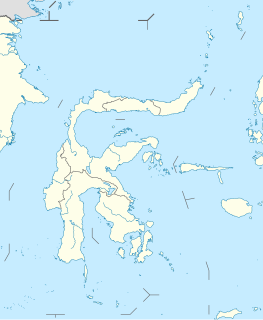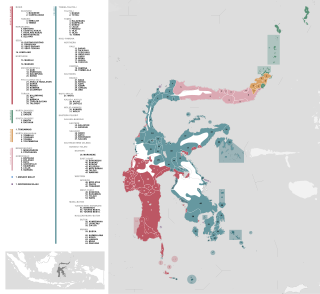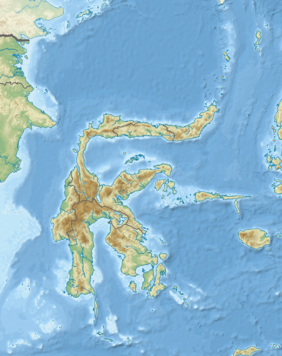
Sulawesi, also known as Celebes, is one of the four Greater Sunda Islands. It is governed by Indonesia. The world's eleventh-largest island, it is situated east of Borneo, west of the Maluku Islands, and south of Mindanao and the Sulu Archipelago. Within Indonesia, only Sumatra, Borneo and Papua are larger in territory, and only Java and Sumatra have larger populations.

Central Sulawesi is a province of Indonesia located at the centre of the island of Sulawesi. The administrative capital and largest city is located in Palu. The 2010 census recorded a population of 2,635,009 for the province, and the 2015 Census of 2,872,859, while the latest official estimate is 3,042,100. Central Sulawesi has an area of 61,841.29 km2 (23,877 sq mi), the largest area among all provinces on Sulawesi Island, and has the second-largest population on Sulawesi Island after the province of South Sulawesi. It is bordered by the provinces of Gorontalo to the north, West Sulawesi, South Sulawesi and South East Sulawesi to the south, by Maluku to the east, and by the Makassar Strait to the west. The province is inhabited by many ethnic groups, such as the Kaili, Tolitoli, etc. The official language of the province is Indonesian, which is used for official purposes and inter-ethnic communication, while there are several indigenous language spoken by the Indigenous peoples of Central Sulawesi. Islam is the dominant religion in the province, followed by Christianity which are mostly adhered by the people in the eastern part of the province.

North Sulawesi is a province of Indonesia. It is located on the Minahasa Peninsula of Sulawesi, south of the Philippines and southeast of Sabah, Malaysia. It borders Davao and Soccsksargen regions of the Philippines to the north, the Maluku Sea to the east, Gorontalo and Celebes Sea to the west and the Gulf of Tomini to the southwest. The province's area is 13,851.64 square kilometres (5,348.15 sq mi), and its population was 2,270,596 according to the 2010 census; this rose to 2,409,921 at the 2015 Intermediate Census, and the latest official estimate is 2,512,900.

In library and information science, cataloging (US) or cataloguing (UK) is the process of creating metadata representing information resources, such as books, sound recordings, moving images, etc. Cataloging provides information such as creator names, titles, and subject terms that describe resources, typically through the creation of bibliographic records. The records serve as surrogates for the stored information resources. Since the 1970s these metadata are in machine-readable form and are indexed by information retrieval tools, such as bibliographic databases or search engines. While typically the cataloging process results in the production of library catalogs, it also produces other types of discovery tools for documents and collections.

Native Indonesians, also Pribumi, is a term used to distinguish Indonesians whose ancestral roots lie mainly in the archipelago from Indonesians of known (partial) foreign descent, like Chinese Indonesians and Indo-Europeans (Eurasians).
The Gorontalo language is a language spoken in Gorontalo Province by the Gorontaloan people. Dialects of Gorontalo are East Gorontalo, Gorontalo City, Tilamuta, Limboto and West Gorontalo.
Bolango is a Philippine language spoken in North-eastern Sulawesi Indonesia. In 1981 it was spoken by some 20,000 people, 5,000 in Bolango and 15,000 in Atinggola.

Bogani Nani Wartabone National Park is a 2,871 km2 (1,108 mi2) National Park on Minahassa Peninsula on Sulawesi island, Indonesia. Formerly known as Dumoga Bone National Park, it was established in 1991 and was renamed in honour of Nani Wartabone, a local resistance fighter who drove the Japanese from Gorontalo during World War II. The park has been identified by Wildlife Conservation Society as the single most important site for the conservation of Sulawesi wildlife and is home to many species endemic to Sulawesi.

Buol Regency is a regency of Central Sulawesi Province of Indonesia. The administrative centre is the town of Buol.

Bone Bolango is a regency of Gorontalo Province, Indonesia, on the island of Sulawesi. It was established in 2003 under Law Number 6/2003. Its regency seat is Suwawa. It has an area of 1,984.31 km² and population of 141,915 at the 2010 Census.
The Gorontalo–Mongondow languages are a group of Austronesian languages spoken in northern Sulawesi, Indonesia.
The Minahasan languages are a subgroup of the Austronesian languages spoken by the Minahasa people in northern Sulawesi. These languages are distinct from the Manado Malay language.

On the Indonesian island of Sulawesi, 114 native languages are spoken, all of which belong to the Malayo-Polynesian subgroup of the Austronesian language family. With a total number of 17,200,000 inhabitants, Sulawesi displays a high linguistic diversity when compared with the most densely populated Indonesian island Java, which hosts 4–8 languages spoken by 145,100,000 inhabitants.

Paguyaman River is a river in Gorontalo (province), Sulawesi island, Indonesia, about 1900 km northeast of capital Jakarta.

Luwu Regency is a regency of South Sulawesi Province, Indonesia. The administrative capital lies at Belopa, since the former capital of Palopo became an independent municipality (city) in 2006, at which date Luwu Regency was split into Palopo city, North Luwu Regency, and East Luwu Regency, with the residue remaining as the new Luwu Regency. The first Regent of the reduced Luwu Regency was H. M. Basmin Mattayang from 2004-2009, then Ir. H. Andi Mudzakkar replaced him as Regent from 2009-2014 following the first direct election in Luwu. Luwu is well known for its natural resources, such as rice, cocoa, coconut, banana, sagu (sago), rambutan, langsat, and others.
Bajaw is the language of the Bajaw, widely known as the 'sea gypsies' of Maritime Southeast Asia. Differences exist between the language's varieties in western Sabah, Mapun in southern Philippines, eastern Sabah, and across Sulawesi to Maluku. However, it is not clear how many languages these would be based on mutual intelligibility.
Ponosakan is an Austronesian language spoken in the vicinity of the town of Belang, North Sulawesi, Indonesia. This language is almost extinct, with only four fluent speakers left as of November 2014.

Gorontaloan or Hulandalo people are the native people of the northern part of Sulawesi. They are the most populous ethnicity in the Minahasa Peninsula. The Gorontaloans are predominantly Muslim. Their native language is Gorontaloan. The Gorontaloans have traditionally been concentrated in the provinces of Gorontalo, North Sulawesi, and the northern part of Central Sulawesi.

The Mongondow or Bolaang Mongondow people are an ethnic group native to the north-eastern part of the Indonesian island of Sulawesi. The Mongondows are predominantly Muslim. They have traditionally been concentrated in the provinces of North Sulawesi and Gorontalo. This ethnic group used to be united by a single entity, the Kingdom of Bolaang Mongondow, which became the western regencies of North Sulawesi after the Indonesian independence.

Gorontalo is a province of Indonesia on the island of Sulawesi. Located on the Minahasa Peninsula, Gorontalo was formerly part of the province of North Sulawesi until its inauguration on 5 December 2000. In Indonesia history, the only Indonesian President from the Gorontaloan people is the 3rd President of the Republic of Indonesia, Prof. DR. Ing. B.J. Habibie. His father, Alwi Abdul Jalil Habibie comes from the "Habibie" clan.














